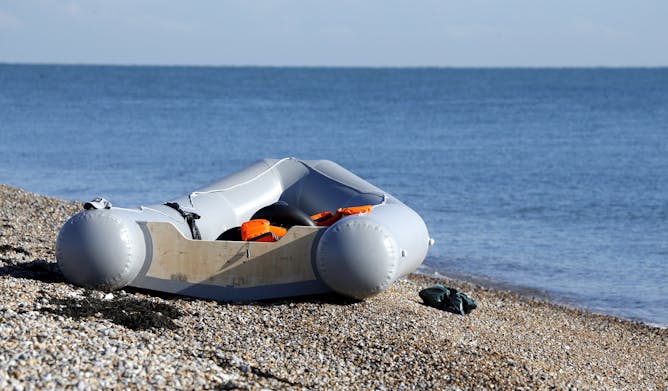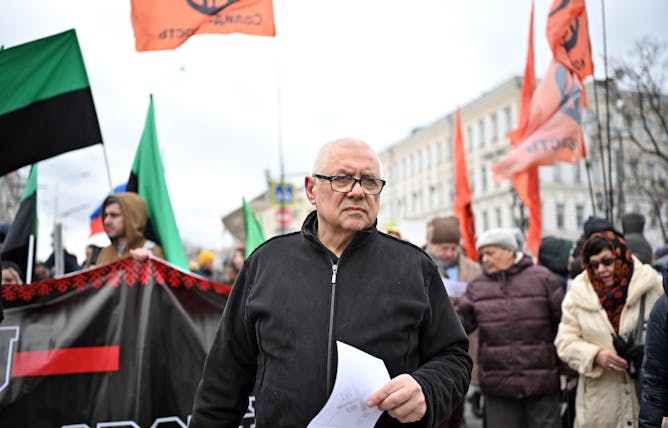|
We’ve all had to do work we might describe as “drudgery”. These tasks are often important – essential even – but so repetitive that our curious, novelty-seeking brains can’t cope with them for very long. For decades we were promised that robots and artificial intelligence (AI) would gradually free us from these mundane chores. Now, we’re beginning to see some of those predictions realised.
Scientists working in a field called synthetic biology have seen a number of laboratory tasks taken over by robots and AI. But, rather than freeing up time, the lab machines used by scientists for their experiments generated additional work for humans. We could do well to pay attention to this cautionary tale at a time when the transformative potential of AI and robotics is ever-present in the news.
To cope with a record high backlog of asylum applications, the Home Office has announced it will instruct thousands of applicants to complete a questionnaire in English. We hear why this plan will be self-defeating. And we learn about the late Gleb Pavlovsky, the Kremlin adviser who was instrumental in creating Vladimir Putin’s macho cult of personality.
Plus, we’re excited to announce a new podcast series that will explore the Great Mysteries of Physics, due to launch on March 8. Watch out for it next week.
Finally, multiple scandals in recent months have shown that the safety and wellbeing of women in British politics is being routinely compromised. And since bullying and sexual harassment become a matter of democracy when the people involved are those elected to represent us, we need to be asking how this situation can be fixed. Join us for an evening event to discuss what is going on in the corridors of power as part of the Social Science Perspectives series of
salon-style events co-hosted by the Campaign for Social Science, The Conversation, and SAGE Publishing.
|

|
Paul Rincon
Commissioning Editor, Science, Technology and Business
|
|

Demands associated with automation can create more work for humans.
Shutterstock / metamorworks
Barbara Ribeiro, University of Manchester
Automation may not reduce our workloads as much as we’d hoped.
|

There are more than 166,000 people in the UK awaiting a decision on their asylum claim.
Sean Aidan Calderbank/Shutterstock
Jo Wilding, University of Sussex
The new procedure leaves applicants no realistic chance of obtaining legal advice.
|

Pavlovsky as dissident at a rally to commemorate the murdered Russian opposition leader Boris Nemtsov.
Alexander Miridonov/Kommersant/Sipa USA
Stephen Hall, University of Bath
Pavlovsky became the ultimate insider – until he fell out with the boss he had helped make all-powerful.
|
Science + Technology
|
-
Jennifer Murphy, Royal Holloway University of London; Geoff Bird, University of Oxford; Kiera Louise Adams, University of Oxford
Do you get scared if you feel your heart speed up?
-
Jenefer Metcalfe, University of Manchester
Several studies have upended what we thought we knew about mummification using scientific dating techniques to reveal some fascinating – and surprising – insights.
-
Mark Lorch, University of Hull
Mary Anning, Thomas Bopp and Ben Bacon are just a few of the nonprofessionals who pushed the frontiers of science.
|
|
Health
|
-
Nilufar Ahmed, University of Bristol
Social norms suggest life’s biggest milestones include things like buying a house, getting married and having kids. But there’s merit in non-traditional milestones, too.
-
Jolanta Burke, RCSI University of Medicine and Health Sciences; Padraic J. Dunne, RCSI University of Medicine and Health Sciences
Joy is very different from our other emotions.
-
Johan Verhoeven, City, University of London; Stefanie Keulen, Vrije Universiteit Brussel
There have only been around 200 reported cases of foreign accent syndrome since it was first reported in 1907.
|
|
Politics + Society
|
-
Baris Celik, University of Sheffield
Where do Nato’s responsibilities end and the EU’s begin – especially when it comes to defence?
-
Louise Thompson, University of Manchester; Alia Middleton, University of Surrey
It’s rare to have quite so many former PMs and first ministers still in parliament.
-
Al Chukwuma Okoli, Federal University Lafia
With the controversies surrounding his electoral victory, Bola Ahmed Tinubu would need to build legitimacy, goodwill and demonstrate capacity to govern effectively.
|
|
Arts + Culture
|
-
Arun Kumar, University of Nottingham
Throughout its known history, Koh-i-Noor has been a symbol of imperial conquest and glory.
-
Helen Warner, University of East Anglia
Director Steven Soderbergh believes he has presented a female perspective, but all he’s done is shoot men in the same dehumanising way that has historically fetishised women
-
Christopher Vezza, University of Glasgow
It might be the world’s most famous album cover, but an album with a strikingly similar cover was released 30 years before The Dark Side of the Moon.
|
|
Business + Economy
|
-
Sian Moore, University of Greenwich
Concerns about the credibility of pay review bodies could boost collective bargaining on worker pay.
|
|
Environment
|
-
Leah Gray, University of Aberdeen; Mike Webster, University of St Andrews
False alarms are common in prey animals, but what causes them and how can they be avoided?
|
|
Podcasts
|
-
Jo Adetunji, The Conversation; Miriam Frankel, The Conversation
🎧 Listen to the trailer for Great Mysteries of Physics, a new podcast.
|
|
|
|
| |
|
|
8 March 2023
•
Manchester
|

|
|
|

|
15 March 2023
•
Sheffield
|

|
16 March 2023
•
Manchester
|

|
|
|
|
| |
| |
| |
| |
| |
|
|